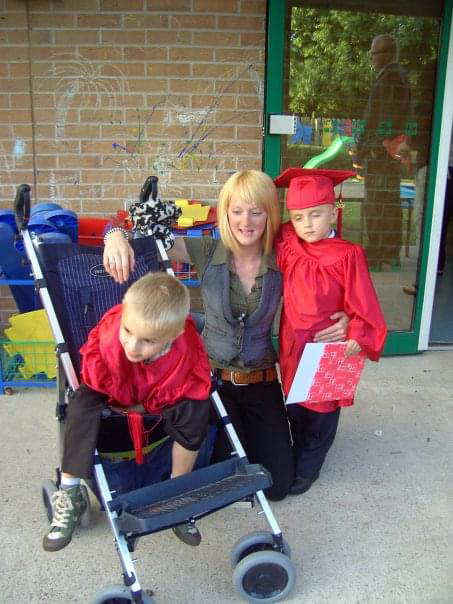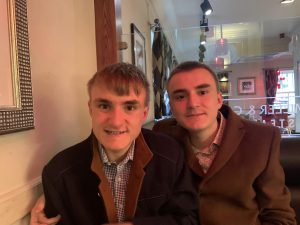Olly and I were born twenty years ago. We are identical in every way until he was diagnosed with autism, learning difficulties, and ADHD. This has led to us having different life plans from the start: I am destined to care for Olly all my life, while Olly is destined to be cared for.
Olly was diagnosed at 18 months old at Great Ormond Street; I don’t remember anything of his diagnosis time as I was still 18 months old myself. I believe my parents found it difficult, and it was a moment that altered their lives forever more, but for me, I still had a great early childhood without the understanding of Olly being different.
My earliest memories of Olly and me together were at nursery. We attended the same nursery, which ended up being the last school we would attend together in our educational careers. Olly was different from the other children and required a helper with him all day, every day. Despite this, he still graduated from nursery like me. My mum still hangs the picture of our nursery graduation, as it is the only thing we will graduate from together.

From the earliest days of my school years when Olly was no longer at the same school, I learned what it meant for Olly to be autistic, have ADHD and have learning difficulties. For me, this meant that Olly could not speak and might never speak; it was not a genetic thing but a thing for us that was given to us by God as we, as a family, could cope with Olly. Religion became so essential for us that we attended church once every two weeks, and the community rallied behind us and prayed for us and Olly.
When I joined high school, Olly matured me as a person. I grew massively because I had to look after Olly more. I helped him dress, shower, clean the house, and look after him. I was very protective of my brother, but sometimes I felt that life was all about him; this made me feel a bit guilty, but I realised as I grew that he needed extra time with my parents, who still never forgot me. I often had Josh and Mum Nights (JAM) nights, where we would have the night off to go to the cinema or for a meal. In addition, I also spent time with my Dad on Wednesdays, where we would watch TV together and talk about life. My grandparents were also a key part of my support for me, and I often went around on Thursday nights to see them and spend time with them, playing board games or cards. We also every other Sunday had a roast dinner and attended church. This is where I also noticed the first stages of support I received from the council; they allowed me to attend a carers club on a Tuesday, which made me feel supported by a group of people going through the same thing. My school finally acknowledged me as a carer and, in year ten, finally allowed me to attend breakfast club, of which the staff were excellent, and this ensured that I could eat breakfast before school in case I didn’t have time before I got to school.
Next in my development was when I joined college; my parents wanted me to be able to be me without Olly and decided to send me to a boarding school for my A-levels. This made me feel nervous as I was no longer with Olly on a day-to-day basis and excited that my existence was not defined as being a carer. However, when the COVID lockdown struck, I had to become a primary carer for Olly due to us having COVID and Olly now being off school. Again, I felt alone in the school I attended; I had Olly through all my lessons, having to feed, entertain, and help him to the toilet. Some of my teachers did make comments about Olly screeching (as he is unable to talk, it is a way of communicating excitement), which made me feel embarrassed to participate in lessons. I also had my camera off to ensure Olly’s dignity, making me feel different, as some teachers highlighted this difference. When I went back to school again, I felt excited again. I was no longer a carer but nervous as I realised that my existence had been about Olly for a long period of my life.

When I went to university, I realised that I was doing something for both of us; my grades and degree were for me and Olly, as he would never be able to get one. I realised how difficult it is for carers to get into a university education, and that is something that is often neglected within academic study. In addition to this, I realised that people often don’t realise I am an identical twin as most twins text or call or come up to visit their twins, and people get to know them, Olly cannot, and people forget that I am one. For university, though, I do feel like Olly has had a massive positive impact on me; he has helped mould me into the independent, self-sufficient person I am who has a drive for my degree because of him. He has also helped me to decide on doing a post-grad when I finish my undergrad, which I am to do in intellectual and developmental disabilities so I can study people like me who are siblings of disabled people, as I have realised as my time at university has gone on how we are often forgotten in research.
I think now when looking back on my life so far, I would say that three things helped keep me going as Olly’s carer. Firstly, the idea of faith has been integral to me as I have grown. The reason we had Olly was because we could cope, and having the support of the wider church community as we grew up helped me understand why Olly was different. Secondly, I would say having a support network of parents, friends and family helped while Olly was growing up, this support network allowed me to vent when I had a difficult time and allowed me to feel like a normal child growing up and now while I am at uni I can have a normal time being me. Lastly, I would say when the going gets tough take it one day at a time, the next day can be better than the last day because who knows where Olly would be in a day, week, month, or year.